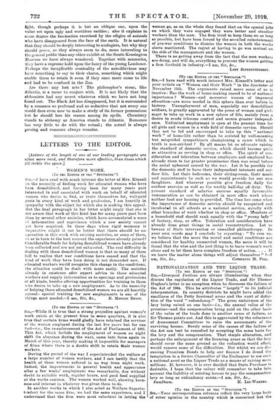NATIONALIZATION AND THE LIQUOR TRADE. [To THE EDITOR OF THE
" SPECTATOR.") SIR,—Liverpool Justices are always illuminating when they discuss the regulation of the Liquor Trade, and Sir Thomas Hughes's letter is no exception when he discusses the failure of the Act of 1904. This he attributes " largely" to its judicial interpretation. In country districts he might have added the smallness of the Petty Sessional areas and the want of defini- tion of the word " redundancy." The gross unfairness of the levy being raised on one basis—i.e., the annual value of the premises—and the compensation being paid on the other basis of the value of the trade done is another cause of failure, as Sir Thomas points out. And this is aggravated by the reluctance of Assessment Committees to raise the assessments of the surviving houses. Surely some of the causes of the failure of the Act can best be remedied by accepting the same basis for the levy and the compensation. That simple alteration, and perhaps the enlargement of the licensing areas so that the levy should cover the same ground as the reduction would affect, would remove some of the difficulties. But whilst we are dis- cussing Premium Bonds to help our finance I do dread the temptation to a future Chancellor of the Exchequer to use such a national asset as the Liquor Trade as a means of raising more millions. If, however, it is ever decided that State Purchase is desirable, I hope that the valuer will remember to take into account the liability of existing houses to pay the compensation levy so long as redundancy exists.—I am, Sir, &c.,










































 Previous page
Previous page